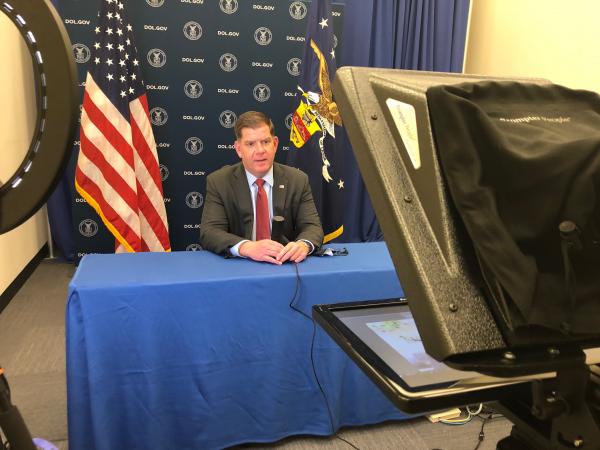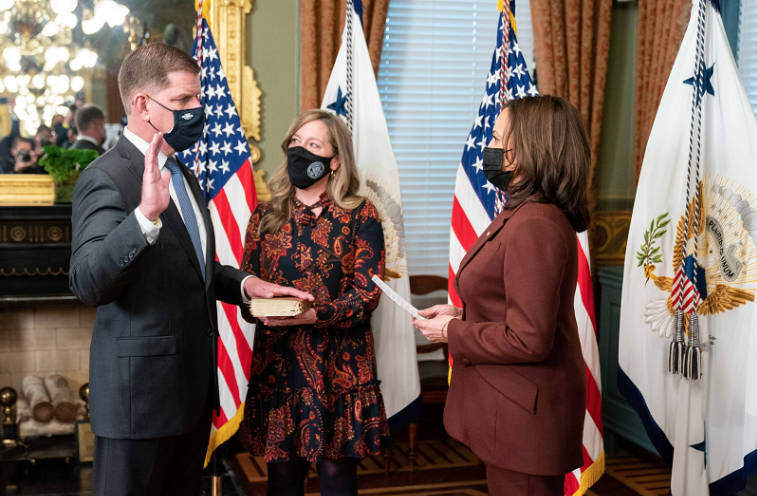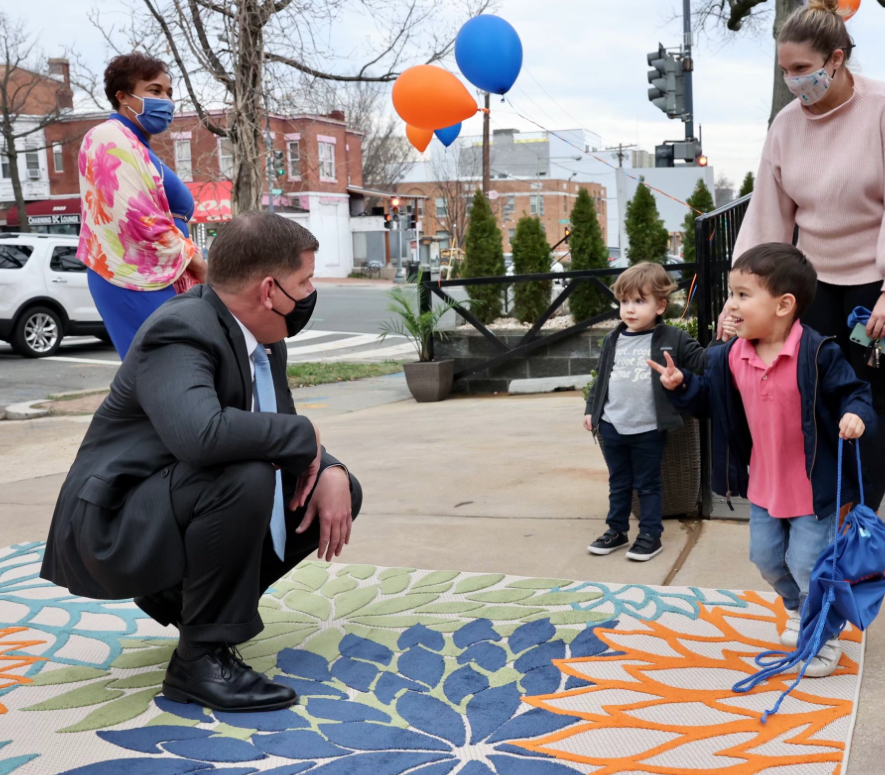April 13, 2021

Secretary of Labor Walsh is shown being interviewed for a TV news program from the Department of Labor in Washington, D.C. DOL photo
US Labor Secretary Marty Walsh spoke to the Reporter this week for his first one-on-one interview with Boston media since he resigned as mayor on March 22. Now three weeks into his tenure as a cabinet member, he talked about his new (hybrid) commute, the conflict he felt about leaving City Hall, and his hopes for what comes next for his successor(s).
Q. How is your new commute?
A. Right now, you know, because of Covid, most of the work is being done remotely. There’s very strict protocols in place right now across the federal government. I've been down to DC every week since the job started. But I'm commuting back and forth. Eventually, I will be doing a lot more time in Washington and around the country, but because of Covbid and some restrictions, I haven't done a lot of traveling yet…. I had to be at a cabinet meeting two weeks ago at the White House. It’s hard to really build a team, and build camaraderie in a team when you're doing it remotely. The difference is that when I was the mayor and we went full remote due to Covid, we had already built a team in this particular case… But the people at the Department of Labor are great, great to work with. Lots of good people, lots of dedicated people…
Q. How are you adjusting to being “former” Mayor Walsh? Has that sunk in yet?
A. Yeah, it's shifting every day as we move on. The best way to explain this job is that some of the skills that I learned being mayor have definitely been helpful, but honestly, a lot of it is from the State House, being a legislator. Working to build relationships, to build allegiances. A lot of that work happens here in this new role. It’s about relationships really, and you know, whether it's internal policy, a lot of policy work. As mayor, you have to make a decision quickly and it affects people instantly, almost. Here, it’s a little different because it's a lot of policy work. As you think about policy, you can't just wake up and say, we're going to do this or that. You have to really think about what's the impact is going to have on the American people and the people that we represent.
Q. What’s the mood like within the cabinet so far?
A. Optimistic. Everyone's really happy. Everyone's really optimistic about the future of America. We all recognize there's a lot of work to be done , but the mood is optimistic and I would say the mood within the Department of Labor as well is optimistic and hopeful. There's a lot of important policy for the American worker that we're responsible for. So, I think that there's a real hope that, you know, we can move our country forward.
Q. Were you surprised at how smoothly your Senate confirmation process went?
A. Not really, because I think a lot of the Republicans in my conversations, they did the homework...I think and I hope there’s a real desire to get things done for the American people. It’s been too long that the partisan politics has led in the dialogue in Washington. And I think that it seems like there's a little bit of a break from that, that we can actually get back to [a time] like we talked about Joe Moakley and Tip O’Neill where there’s an understanding and a respect for each other…. So, I mean, I think this is the fastest cabinet put in place in 50 years. It was a fairly quick process. Personally, it was hard because for eight weeks everyone was looking to me and saying, ‘When do we move on here in Boston?’ And it seemed like a long time for all of us.
Q. Where were you when you got the call from President Biden asking you to join his cabinet?
A. I was in the mayor's office. I was getting ready to practice my State of the City. Practice was at one o'clock. I talked to the president at five minutes to one. He called me on my phone and asked me if I would consider joining his administration.
Q. Did you feel in the days leading up to that that you probably get the call or did you just not know?
A. A couple of days before hand I had a feeling I was going to get the call. Up to that point, I was not sure because obviously there were other people in contention for the role as well. I was kind of just reading the paper and the different political stories about what the process was. So, I really didn't have any inside scoop per se, that let me know that, you know, I’m actually the president's guy. The president did make comments the day before when they asked him a question specifically about the Department of Labor, he said something to the effect of: It's about diversity in the cabinet, so I need an Irishman in the cabinet…
Q. Do you remember what you said to him when he asked you to join him?
A. I said I was honored. I congratulated him on his election. I hadn't talked to him one-on-one since the election. I'd been on Zooms with him and with other folks, but I had not been one-on-one. I told him how proud we were of him being elected….We talked about a couple of other things. And then, at the end of the conversation, he said to me, ‘Marty, you didn't accept the job yet!’ [Laughing] And I said of course, I’d be honored to serve in your administration.

Above, Secretary Walsh, joined by his partner Lorrie Higgins, was sworn-in by Vice President Kamala Harris on March 23. White House photo
Q. How conflicted were you about staying as mayor, as opposed to joining the cabinet?
A. Very. Very conflicted. It tore me up a bit inside, because being mayor of the city I grew up in the city I love— and being a state rep before that— it was really hard. I was thinking about the people that work with me every day. That was the hardest thing. How would I let them know? You know, these are folks that, some, some were with me from 2013, some were with me from 1996. Some, I just met a few months ago. It was really hard. It's still, to some degree, hard. You know, when I think about my team at City Hall, I do get sad because I'm fortunate to have worked with so many incredible, wonderful people. And, you know, they're the ones who actually make the city look great and make me look good. It was hard.
Q. Have you had time to consider what your legacy as mayor might be?
A. I don't really think about legacy. I just think of how fortunate I am to have had the opportunities in my life. You know, it's amazing. When I was in the cabinet meeting the other day, I was sitting two seats over from the vice president and across from the president. And I was just thinking like, ‘Oh my God, you know, I'm in the cabinet for the president of the United States of America. And just thinking about the journey to that role, to that spot, it was just amazing…. I'm not sure what the legacy is, but you know, I'm just honored to have had these incredible opportunities and it's because people trust me and put their faith in me.
Q. You could have served another two terms and you still would have been asked the question when leaving: What didn't you finish that you wanted to finish? Is there one thing that stands out for you that you would like to see the next mayor finish and bring to fruition?
A. Yeah, I think one thing is the procurement piece. We did a lot of work. We did the disparity study, probably a few years later than we probably should have, but we did do it. It was done last year going into a re-election and I was going to be explaining it and defending it, but I think the procurement, and advancing people of color in public contracting is something that's really important. I do get an opportunity as Secretary of Labor to actually make a difference on a national scale. But I learned it wasn't for lack of trying, it was just the process of it. So, I think that's one area I think I'd like to see.
And then on some of the other things, it's more the concrete, bricks, and mortar. You know, City Hall Plaza and seeing more libraries being built and more schools being built and fire houses, things like that.
The city's in a good place to be able to continue that growth that we've done over the years. So, it's not going to grab headlines, but it's about building the infrastructure for the city.
So I, if I did it another term— I don't think I'd do a couple of terms— but if I did another term, I would be really, really focused on the procurement piece of it and I would've focused on the building.
And then the schools, I don't think the school department gets enough credit for the work they've done. People tend to point out the shortcomings of the schools in Boston. They don’t look at the gains. And, when DESE put out the report, we had the highest four-year graduation rates in the history of Boston this year. You know, we can't ignore that. I mean, I know there’s challenges. It’s public education, there's challenges. But, really, there’s some great things there with the school department. So, I'm really proud of the work they've done. There's more to be done. No one mayor is going to fix or adjust the schools the way that make them transformative like we need them. But it's going to be several administrations that are going to do that.
Q. For all of the turmoil and challenges of the last year with Covid, your favorability rating among Boston voters remains high. Do you take some satisfaction from that?
A. I guess, obviously as a person, yes. But I really would take satisfaction that I've left the city in a really strong position to move forward. Fiscally, we're the strongest we’ve ever been, with seven years straight of AAA bond rating. Our pension, liability, debt, as long as we stay on schedule, will be fully funded by 2024. There really aren’t many, if any, cities in America that can say that.
The diversity of hiring since I became mayor has been 65 percent people of color, 55 percent women. We’ve tackled issues like pay equity. We’ve done police reform. I think we’re one of the only cities in America that actually did police reform and we did it with a group of private citizens who were on that task force and did some great things…. I'm really happy that we laid down a real good foundation for the next person, whether it's Kim Janey who is obviously doing a lot of stuff now, and then there's a race for mayor. So, there's a really good strong foundation. Whoever it is will not be inheriting a city that is a disaster.
Q. Does part of you wish you could have had this final race to run on that record? Any regrets about not being able to seek a third term?
A. I mean, obviously I love campaigning, you know that. But, no, I have a job to do today. My job today is the Secretary of Labor for the United States of America and the constituency that I represent is the entire country. I need to make sure that President Biden’s and Vice President Harris’s goals and objectives are carried through. And that's my job now. I have a new focus right now in my life and I'm going to give it 110 percent of my life.
Q. Will part of that skill-set — campaigning— come in handy as you are asked to make the case for the Biden-Harris agenda?
A. Absolutely. One of the goals and the charges that the president gave to me and other secretaries the other day was to be the lead on the American Jobs Plan. And, we're doing meetings and interviews and talking about this and eventually, hopefully, we’ll get around the country to talk about the importance of this plan about building back, better. So I'm excited about that and excited about working with members of Congress and both Democrats and Republicans to try and sell this plan.

Secretary Walsh greeted children and parents outside of a child care center in Washington, D.C. on March 25. DOL photo


